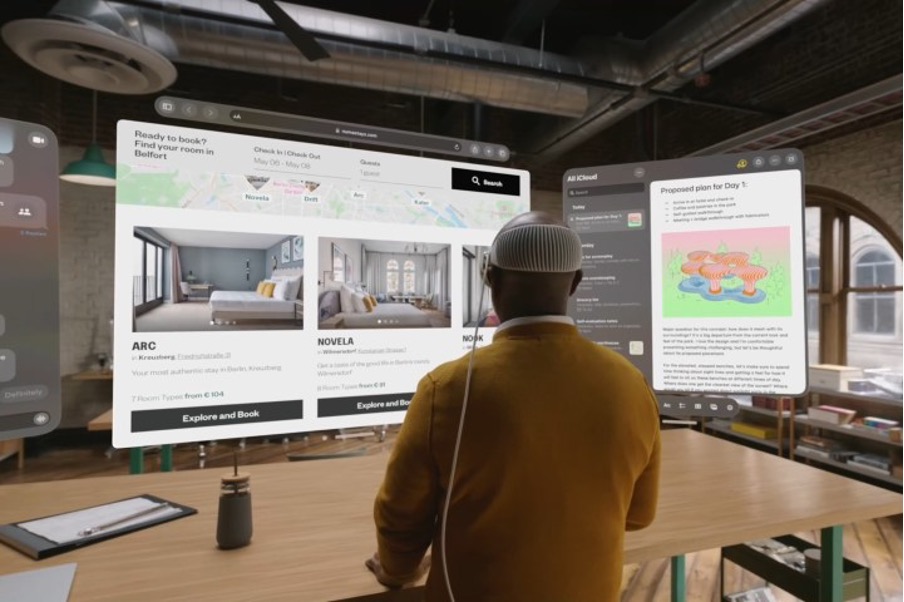
2023-11-7 20:45:17 Author: blogs.sap.com(查看原文) 阅读量:2 收藏
Apple’s Vision Pro and SAP S/4HANA:
The potential to revolutionise the ERP experience with augmented reality.
Apple recently announced its new augmented reality headset, the Vision Pro. This much-anticipated device seamlessly blends the real world and the virtual world, offering users an immersive and authentic experience. But what does this mean for industry processes in SAP?

Most previous attempts at AR technology implementations have failed, mostly because of costs and UX. Thanks to this new product, an immense potential for AR can finally manifest.
This blog is simply an exploration of what it could mean for various lines of business of SAP.
Today, the Fiori AR library (using apple’s AR SDK since 2015 and regularly updated) is the first concrete step on this journey. Creating Fiori applications that use AR is possible today, and will only get better with time and new hardware.
Where to start: Data and Integration to your SAP
While Apple lays the groundwork with Vision Pro and AR, the real magic happens when these technologies are integrated with robust systems like SAP. The vast amounts of data that SAP handles can be fed into these AR systems, providing users with real-time, actionable insights in their physical environment. The SAP Integration Suite and SAP Data Sphere solutions will probably be the cornerstone for making the following cases possible.
- Real-time 3D Data Visualization and Analysis in SAP Analytics Cloud
AR, particularly when coupled with Vision Pro, presents the ability for companies to visualize data in real-time in a physical environment. This is probably one of the low-hanging fruits to consider. 3D visualizations have an immense potential for readibility: SAP has experience in this domain. Imagine a boardroom meeting, or a factory floor where managers, using Apple’s AR glasses, can see real-time stats of finance or machine performance superimposed on the actual machines. This real-time 3D visualization can fasten decision-making, allowing for prompt interventions when anomalies arise.
- Training & Skill Development in SuccessFactors
Traditionally, training in many industries has relied on textbook manuals, videos, and trial-and-error. With AR embedded in SuccessFactors, new employees could have a virtual guide showing them step-by-step processes right in their line of vision. This not only speeds up the learning curve but also significantly reduces the margin for error, ensuring that quality is maintained.
- 3. Enhanced Customer Experiences for SAP Customer Experience
From retail to real estate, the immersive experience provided by AR can completely revamp the customer journey. Customers could try out products virtually before purchasing or visualize how furniture might look in their actual living space. The degree of personalization and interactivity that AR brings can deeply influence purchasing decisions.
- 4. Supply Chain and Logistics for SAP Extended Warehouse Management
Mapping out warehouses, optimizing routes for pickers, and visualizing stock levels become exponentially more efficient with AR. Workers equipped with AR glasses can be shown the quickest path to retrieve an item, and stock levels can be automatically updated in real-time in the SAP system as items are picked.
- 5. Collaboration Across Geographies for SAP Entreprise Product Development
AR can bridge the gap between teams spread across different locations. Design teams, for instance, can collaborate on a product design in a shared virtual space, making real-time tweaks and changes, even if they’re continents apart. This kind of collaboration can drastically reduce the time-to-market for new products.
In conclusion, The combination of SAP’s robust and rich processes with the Apple Vision Pro has the potential to revolutionize industry processes by providing workers with real-time information and visual aids.
SAP is present in the iOS world, and will certainly contribute to VisionOS next.
Only time will tell if this bet pays off, but one thing is certain: the future of industry processes looks bright with the Vision Pro.
如有侵权请联系:admin#unsafe.sh